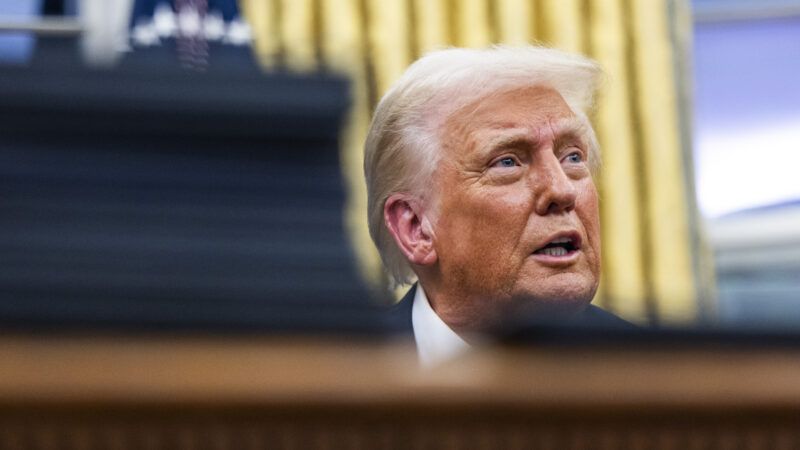Trump's Birthright Citizenship Order Doesn't Just Apply to Undocumented Immigrants
Children could be denied citizenship even if their parents are here completely legally.

President Donald Trump signed a slew of executive orders on the first night of his second term, setting many of his campaign trail promises into action. Among those was his order challenging birthright citizenship—the 14th Amendment's guarantee that "all persons born or naturalized in the United States, and subject to the jurisdiction thereof, are citizens of the United States."
"The Fourteenth Amendment has never been interpreted to extend citizenship universally to everyone born within the United States," noted the executive order, which applies to babies "who are born within the United States after 30 days from the date" of its issuance. It directs U.S. government departments and agencies to stop issuing and recognizing citizenship-affirming documents for certain U.S.-born babies.
Last night's order outlined two categories of individuals born in the U.S. who do not automatically receive citizenship, in the White House's view. The first is a baby whose mother was unlawfully present in the U.S. and whose father was not a U.S. citizen or lawful permanent resident at the time of that baby's birth. The second is a baby whose mother's presence in the U.S. "was lawful but temporary" and whose father was not a U.S. citizen or lawful permanent resident at the time of that baby's birth.
In other words, the order doesn't just apply to children born to undocumented immigrants. "Lawful but temporary" status includes people "on a student, work, or tourist visa," according to the White House.
Some visa holders maintain a "temporary" presence in the U.S. for decades. Skilled foreign workers on the nonimmigrant H-1B visa must apply for a green card to stay in the U.S. permanently. The number of employment-based green cards issued annually is capped, and there is also a cap on how many green cards may be issued to nationals of a single country per year—just 7 percent. "The vast majority of pending green card applications—nearly 90 percent—are from India," wrote the Cato Institute's David J. Bier in 2023. As a result, over 1 million Indian workers and family members are stuck in the green card backlog.
Many of these individuals, and others who have gone through every step to maintain legal status in the U.S. but cannot get a green card, have bought homes, become involved in their communities, and intend to build lives in the United States. They do so in spite of the uncertainty that green card backlogs introduce. Trump's executive order would add to that uncertainty.
The order's scope aside, it is highly unlikely to survive the legal challenges it is already facing. Reason's Jacob Sullum has noted this order "is bound to provoke a constitutional argument that Trump cannot win." The president's interpretation of the phrase subject to the jurisdiction "contradicts the definition that the U.S. Supreme Court embraced in 1898" in U.S. v. Wong Kim Ark, Sullum continued. The Supreme Court reaffirmed that case's holding and "made express what it had held implicitly," wrote Georgetown University law professor Steve Vladeck in December: "that the Citizenship Clause therefore applies to children of undocumented immigrants, specifically."
"Given just how much of a stretch the legal arguments on the citizenship front are," Vladeck continued, "we ought to consider the possibility that, in fact, the hullabaloo surrounding birthright citizenship ends up—deliberately or not—distracting from more effective, and more legally defensible (if not necessarily legal) shifts in immigration policy that come along at the same time."


Show Comments (276)